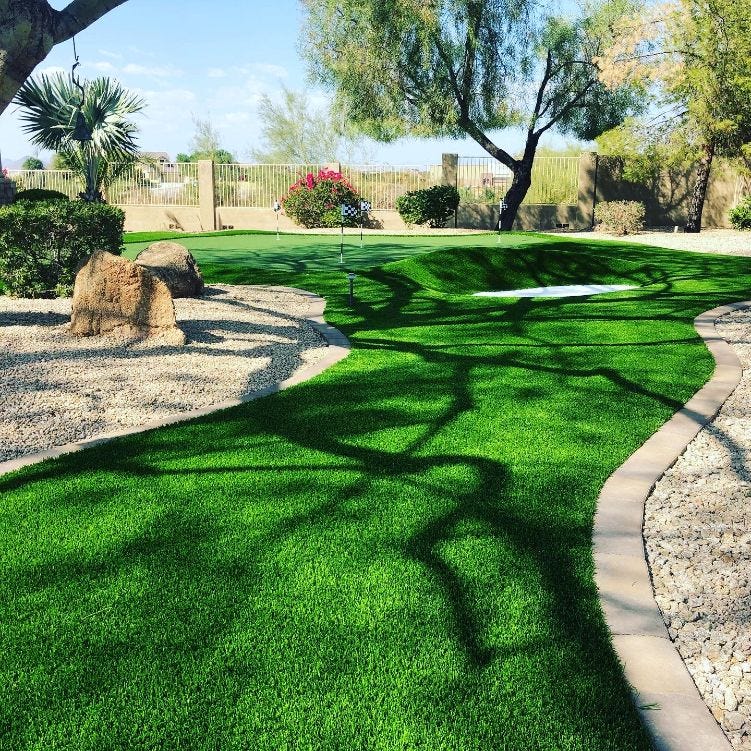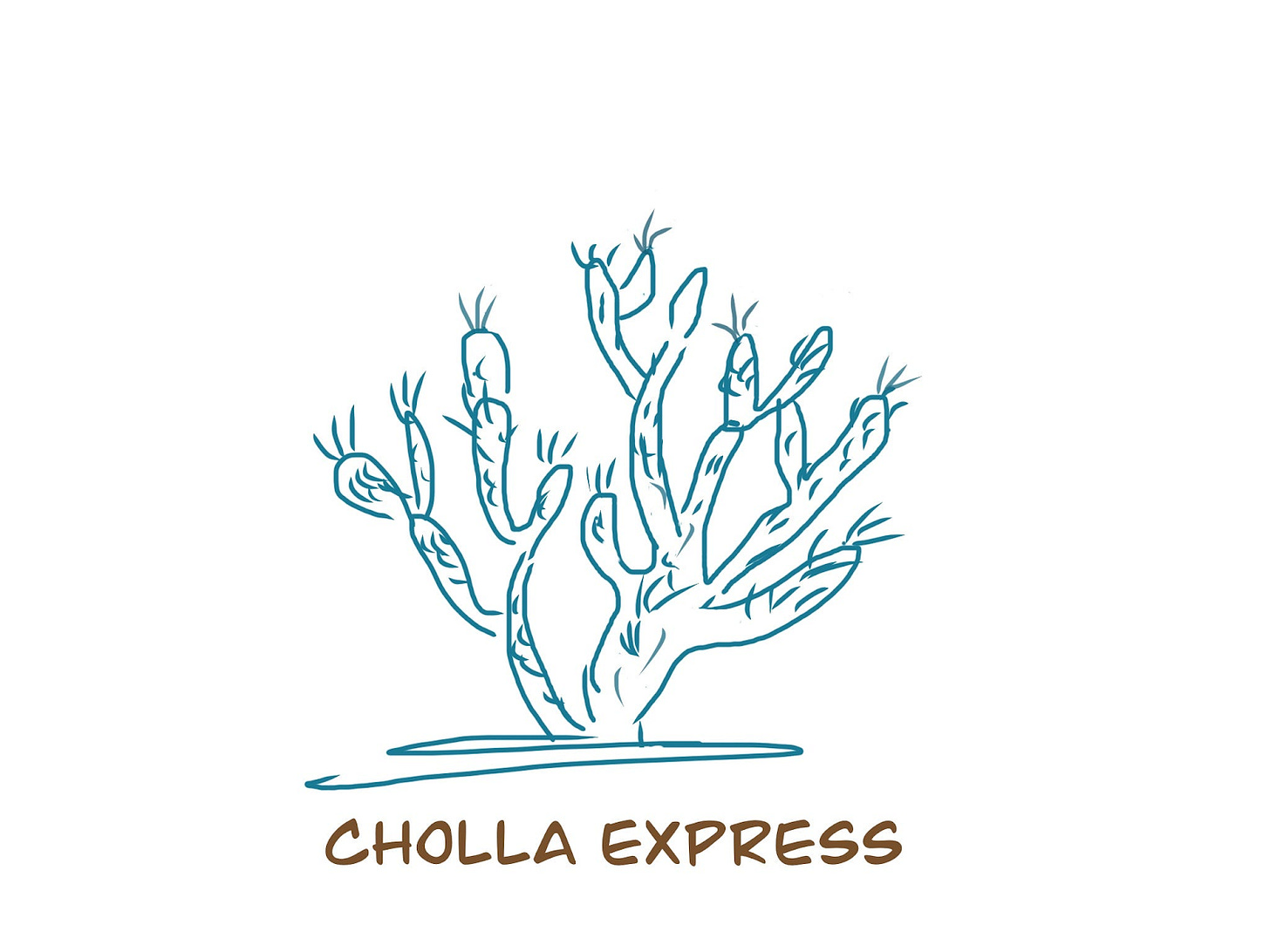Delete Your Lawn
The pros and cons of artificial turf. Plus, a few thoughts on school vouchers.
Everybody knows we live in a desert, and hopefully everybody knows we’re experiencing a major drought.
Despite this knowledge, it seems like regular folks are waiting for the higher-ups to solve our water problem. That is to say, there doesn’t seem to be any popular urgency to conserve water in order to avert a downstream crisis.
I understand the feeling. Our house has a mostly desert landscape, but we do have a small lawn in the backyard. The lawn is 85% dead. I had been trying to keep the lawn alive with minimal watering, but that didn’t work out so well in the scorching month of June. So we’re left with two options for a green lawn: Dump a bunch of water on the grass, or rip out the grass and install artificial turf.
In the grand scheme of things, this decision doesn't matter much. The lawn is quite small. The ability for the city of Phoenix to thrive into the ‘30s and beyond doesn’t depend on whether this patch of grass gets watered or not.
But it might help if the people of Arizona generally adopted a stronger ethos of water conservation. We’re experiencing a major drought. Shouldn’t we be acting like it?
If nothing else, an ethos of water conversation might help impact the state’s priorities. They took action in the last legislative session to put cash towards water projects. But there are experts who say we should be conserving drastically more water. And fast.
Policy decisions by the higher-ups are critical. Somebody needs to negotiate interstate water deals involving complex questions most people don’t understand, nor care to understand. We need competent leaders to enact good water policy. We need honest leaders to make decisions that are in the best interests of the state as a whole.
Cities in Arizona may start implementing water cut policies if the drought gets worse, as projected.
Satellite photos of the dwindling water levels at Lake Mead — a key water reservoir — may cause regular folks to wake up to this issue.
But I’m not holding my breath for a change in popular consciousness. With so many other things to worry about these days, and with so much entertainment available at our fingertips, our fate will be left to the higher-ups. God help us.
As for the lawn dilemma, here are the pros and cons of artificial turf:
PROS
Never have to mow it
Never worry about fertilizer
Not a friendly environment for bugs
Always green
Possibility for a putting green, if you like golf
Save on your water bill
CONS
Installation fees (AZ turf masters has a price calculator; i.e. $4k for a 600 sq ft. lawn)
Can’t dig holes
What if your dog doesn’t like it?
Wear and tear
Hopefully it doesn’t melt in the summer

Can teachers make more money with school vouchers?
Proponents of school vouchers like to repeat a catchphrase popularized by school-choice activist Cory DeAngelis, saying we should “fund students, not systems.” Which means we shouldn’t give money to school districts and charters to operate public schools. Instead, the theory is we should give each student a certain share of public money to allow them to spend money on whatever educational options they want. Maybe it’s tuition for a school, maybe it’s a combination of books and tutors.
A law just passed in Arizona allowing any student to receive $7,000 towards these purposes, although the law may be put on hold if voucher opponents gather enough petition signatures by September. This law isn’t a complete manifestation of the “fund students, not systems” catchphrase because the state will continue to fund the public school system at the normal levels, upwards of $14,000 per student (combining state, local, and federal dollars) depending on the school funding formula.
Theoretically, good teachers can make more money with school vouchers. Who needs “systems” when students can pay teachers directly? Imagine you are the best math teacher in the state of Arizona. Think of how many students would want to take your class! However, you would need the physical space to teach these students. And the students would want to use their money to pay multiple teachers, not just one math teacher.
The next thing you know, we’ve re-invented a school.
Microschools are a different thing. The microschools I’ve read about function by using a digital curriculum and cutting costs by hiring class supervisors to manage the students. They don’t pay high salaries to good teachers. I have nothing against this kind of school. Some students will thrive outside the traditional school structure. More power to them.
Maybe universal vouchers will lead to an improved menu of educational options for students. Maybe they will lead to a decentralized system of mediocrity.
At the end of the day, I think it will go back to the same questions:
What makes a quality school?
How do we replicate good schools?
The workforce model has been proposed as a method to avoid teacher burnout and produce a more consistent educational framework. I’m not entirely sold on this model, but I’m happy for the initiative. I still believe it’s possible to simplify the teaching profession, empower teachers with more autonomy and more money, and recruit enough good teachers to build quality schools at scale.
Links and News
On my other blog I posted a book review of Why We Did It, a fantastic psychological history of the people who created the Trump presidency, written by a Republican political operative who walked away before things got too dark. Sorry for broaching partisan politics in this newsletter, but if extremists take control over the state government, it will impact all of our lives. If you aren’t paying attention to state politics lately, I encourage you to do so. Read up and vote. Talk to your friends. If you disagree with my concerns, write me a note. I’m always open to listening to different points of view.
LA Times news story: They sounded alarms about a coming Colorado River crisis. But warnings went unheeded
Joanna Allhands is a water expert and columnist at the Arizona Republic. Here are links to three columns she’s written in the past few months:
1. Metro Phoenix needs to save water, but how? Residents need a far simpler message
2. How do I save water in metro Phoenix? How to choose actions that actually conserve
3. We'll use significantly less Colorado River water, no matter how this plays out

